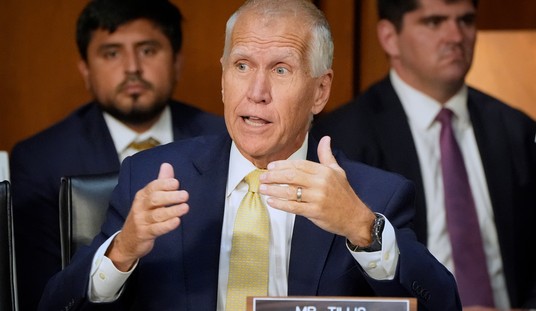Wisconsin Democrats have agreed to participate in a vote on a bill restricting collective-bargaining rights for public employees. “Assembly Democrats agreed to offer only 38 more amendments, one for each member, and restrict debate on each to 10 minutes … That should allow a vote on the bill this afternoon.” Jennifer Rubin believes this will increase pressure of Wisconsin’s Democrat senators to come out of hiding. “So senate Democrats are going to remain out of state while their assembly colleagues give way to the will of the majority?”
Walker may be winning by forcing the Democrats to re-engage using the oldest trick in the book: taking policy ground they can’t afford to surrender and forcing them to come out and fight for it. Rubin notes that “Republicans easily passed a bill repealing a requirement that law enforcement collect data on the race of all drivers they stop. Republican leaders also scheduled a vote for Thursday on a bill to require people to show photo ID to vote”. In other words, Walker is coming after the race card and the non-id card, things that must on no account be allowed to happen.
Ezra Klein, one of the Democrat’s supporters at the Washington Post lamented that Scott Walker ‘understands power’, in demonstrating his ability to use the budget issue to create structural change. And why not? Walker had good teachers, some of whom Klein may even admire. Rahm Emmanuel famously advised everyone to never let a crisis go to waste, and not just the Democrats can read.
The connoisseurs of “us” versus “them” should watch Libya. The uprising against Khadaffi in Libya is beginning to depict itself along tribal lines. The New York Times describes the motley crew defending Khadaffi’s western stronghold from the rebels.
Distrustful of even his own generals, Colonel Qaddafi has for years quietly built up a ruthless and loyal force to safeguard his rule. It is made up of either special brigades headed by his sons, segments of the military loyal to his native tribe and its allies, and legions of African mercenaries he has helped train and equip. Many are believed to have fought elsewhere, in places like Sudan, but he has now called them back.
Witnesses said on Wednesday that thousands of members of this irregular army had massed on roads to Tripoli. The scene, one said, was evocative of anarchic Somalia: clusters of heavily armed men in mismatched uniforms clutching machine guns and willing to carry out orders to kill Libyans that other police and military units, and even fighter pilots, have refused.
Indeed, both the ferocity of the uprising and the tenacity of the defense is partly due to the fact the fate of tribes, not just individuals, is at stake. Khadaffi belongs to a tribe which was historically unimportant, but whose members until recently enjoyed favored treatment. A book reviewed in Foreign Affairs asserted that “the Libyans were not a nation, had no affinity for Western-type political institutions, and had strong ‘stateless’ traditions”. Now that tribal pecking order is being challenged; and if successfully upended, means the end of not only of a tribe’s privilege but perhaps of its own existence.
Stakes are high in tribal warfare. So the major tribes are represented in the military, but Khadaffi’s inner security circle is recruited largely from the Qathafa, sometimes called the Khadaffi tribe. But it is too small to dominate by itself. The balance of power may be held by the Magariha, whose loyalty Khadaffi tried to purchase by ransoming its most famous son — the Lockerbie bomber.
The leadership of the Magariha tribe acknowledges a debt of gratitude to Gaddafi and his regime for securing the return of one of the tribe’s members, Abdel Baset al-Megrahi, from prison in Britain after he was convicted of being behind the Lockerbie bombing. However sources also told Asharq Al-Awsat that this has not prevented a number of youths of the Magariha tribe from participating – with members from other tribes – in the demonstrations and protests against Gaddafi’s rule, especially in cities in eastern and southern Libya.
Now the deals are off and the Magariha may now be renegotiating their contract. Like the Republicans in Wisconsin, the rebels understand power. The struggle in Libya is now over strategic terrain that can’t be conceded — the oilfields and pipelines. “All southern oilfields are in rebel control. Moustafa Raba’a, a mechanical engineer with the Sirte oil company, said pressure had been put on field and refinery managers to stop work and protect all foreign nationals working with them.”
This means most of the talk about sanctioning Libya is meaningless because the Libyans are already sanctioning themselves. Forces on both sides are denying the flow of oil to the other either by getting the foreigners to stop operations or blowing up things. Too late also is talk about pressuring Libya to end a “violent crackdown” on protesters, not only because Khadaffi himself looks about to fall but because the situation never resembled the classic street demonstrations of Europe but irregular warfare. The President’s diplomatic initiatives to stop the “violent crackdown” have already been overtaken by events.
In his first remarks on the uprising that has split the North African country and prompted a deadly response from Libyan leader Muammar Qaddafi and his loyalists, Obama described “the suffering and bloodshed” as “outrageous” and said those responsible must be held accountable.
“These actions violate international norms and every standard of common decency,” Obama said yesterday at the White House after meeting with Clinton.
While Obama didn’t specify what steps he would pursue if Qaddafi doesn’t halt reprisals against the opposition, officials at the White House and State Department said earlier they may include punitive measures, such as freezing Libyan assets, that might be taken by the U.S. alone or in conjunction with other nations.
His game is really about the carcass; it is about who they can make a deal with and how they can persuade the last men standing to talk to them. What is still uncertain in Libya is which coalition of tribal leaders or personalities will emerge in the post-Khadaffi era the West will recognize. That is to say, who will give the go ahead to refineries to continue operations? And the debate over Libyan assets probably has less to do with stopping Khadaffi than who gets Libya’s overseas assets. Hillary Clinton’s trip to Geneva is probably about how to deal with the successor regime, if any, rather than about the Duck of Death’s remaining days.
And it may be no one. There is some chance that Libya may slide into a prolonged period of anarchy, like Somalia, as one side tries to get the upper hand against the other. Or maybe it will turn out be an Islamic Caliphate. Like Wisconsin’s vote, the Geneva meeting is about unfinished business in North Africa. Neither in Madison nor Tripoli will things be over in a week.
Daniel Howes of the Detroit News argues that if the Republicans know what’s good for them, they should go slow the insurrection which began in Wisconsin before they tears things apart. Because things ain’t gonna be that easy in Detroit or in other places where the unions and the Democrats are dug in, in case they don’t know it by now.
Walker’s Wisconsin gambit, and others percolating in the state legislatures of Indiana and Ohio, imperils more than the existing wage and benefit structure of public employees. It threatens the political gravy train that labor has used to influence politics to its benefit, up to and including presidential elections.
In other words, Wisconsin’s “WisTeria” and the smaller copycats in neighboring states have undeniably national political implications for the re-election of a Democratic president, the chance for this party to retake Congress and a Republican ability to solidify gains won last November and perhaps retake the White House.
Battleground doesn’t begin to describe it, which is why there may be less unanimity among Republicans and business types on how to proceed than simple stereotypes allow. As much as the economic metrics of right-to-work states down South appear to make the case for moving in that direction as quickly as possible — higher growth rates, rising incomes, population gains — does the cost amid trying economic times justify spending so much political capital?
In political situation that is all about tribes, upsetting the apple cart — or the kebab wagon — is really going to cost. A way of life just doesn’t let itself be buried alive. Like Khadaffi, it goes down kicking and screaming. Does anybody want that? Does anyone have a choice?
[youtube zm_Fl3AszuU]
“No Way In” print edition at Amazon
Tip Jar or Subscribe for $5










Join the conversation as a VIP Member